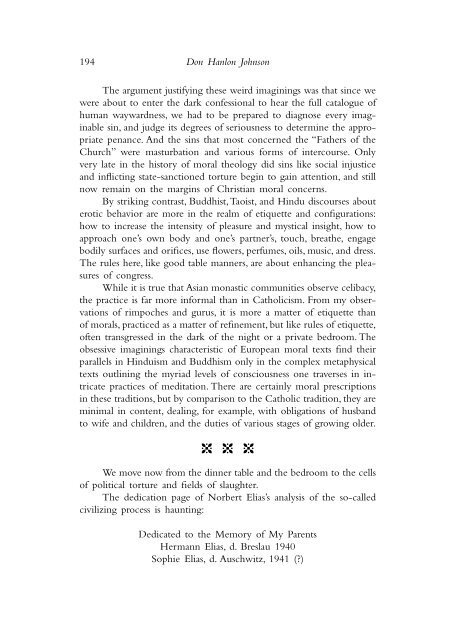You also want an ePaper? Increase the reach of your titles
YUMPU automatically turns print PDFs into web optimized ePapers that Google loves.
194 Don Hanlon Johnson<br />
The argument justifying <strong>the</strong>se weird imaginings was that since we<br />
were about to enter <strong>the</strong> dark confessional to hear <strong>the</strong> full catalogue <strong>of</strong><br />
human waywardness, we had to be prepared to diagnose every imaginable<br />
sin, and judge its degrees <strong>of</strong> seriousness to determine <strong>the</strong> appropriate<br />
penance. And <strong>the</strong> sins that most concerned <strong>the</strong> “Fa<strong>the</strong>rs <strong>of</strong> <strong>the</strong><br />
Church” were masturbation and various forms <strong>of</strong> intercourse. Only<br />
very late in <strong>the</strong> history <strong>of</strong> moral <strong>the</strong>ology did sins like social injustice<br />
and inflicting state-sanctioned torture begin to gain attention, and still<br />
now remain on <strong>the</strong> margins <strong>of</strong> Christian moral concerns.<br />
By striking contrast, Buddhist, Taoist, and Hindu discourses about<br />
erotic behavior are more in <strong>the</strong> realm <strong>of</strong> etiquette and configurations:<br />
how to increase <strong>the</strong> intensity <strong>of</strong> pleasure and mystical insight, how to<br />
approach one’s own body and one’s partner’s, touch, brea<strong>the</strong>, engage<br />
bodily surfaces and orifices, use flowers, perfumes, oils, music, and dress.<br />
The rules here, like good table manners, are about enhancing <strong>the</strong> pleasures<br />
<strong>of</strong> congress.<br />
While it is true that Asian monastic communities observe celibacy,<br />
<strong>the</strong> practice is far more informal than in Catholicism. From my observations<br />
<strong>of</strong> rimpoches and gurus, it is more a matter <strong>of</strong> etiquette than<br />
<strong>of</strong> morals, practiced as a matter <strong>of</strong> refinement, but like rules <strong>of</strong> etiquette,<br />
<strong>of</strong>ten transgressed in <strong>the</strong> dark <strong>of</strong> <strong>the</strong> night or a private bedroom. The<br />
obsessive imaginings characteristic <strong>of</strong> European moral texts find <strong>the</strong>ir<br />
parallels in Hinduism and Buddhism only in <strong>the</strong> complex metaphysical<br />
texts outlining <strong>the</strong> myriad levels <strong>of</strong> consciousness one traverses in intricate<br />
practices <strong>of</strong> meditation. There are certainly moral prescriptions<br />
in <strong>the</strong>se traditions, but by comparison to <strong>the</strong> Catholic tradition, <strong>the</strong>y are<br />
minimal in content, dealing, for example, with obligations <strong>of</strong> husband<br />
to wife and children, and <strong>the</strong> duties <strong>of</strong> various stages <strong>of</strong> growing older.<br />
� � �<br />
We move now from <strong>the</strong> dinner table and <strong>the</strong> bedroom to <strong>the</strong> cells<br />
<strong>of</strong> political torture and fields <strong>of</strong> slaughter.<br />
The dedication page <strong>of</strong> Norbert Elias’s analysis <strong>of</strong> <strong>the</strong> so-called<br />
civilizing process is haunting:<br />
Dedicated to <strong>the</strong> Memory <strong>of</strong> My Parents<br />
Hermann Elias, d. Breslau 1940<br />
Sophie Elias, d. Auschwitz, 1941 (?)
















